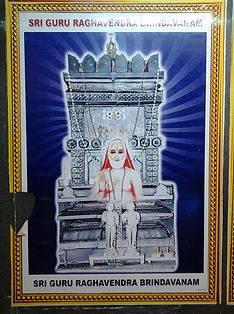
HISTORY


HISTORY OF SRI RAGAVENDRA SWAMY
Sri Raghavendra Swami was born as Sri Venkata Natha (Venkata Ramana), the second son of Sri Thimanna Bhatta and Smt. Gopikamba on Thursday, Sukla Navami of Phalguna month in 1595, when the moon was in Mrigashīrsha Nakshatra, at Bhuvanagiri, near present-day Chidambaram in Tamil Nadu. Sri Thimmanna Bhatta was the son of Sri Kanakachala Bhatta and the grandson of Sri Krishna bhatta, a Veena scholar in the court of King Krishnadevaraya. Sri. Thimanna Bhatta and his wife, Smt. Gopikamba had a son, Gururajacharya and a daughter, Venkatamba.
Sri Venkanna Bhatta was also called Venkatanatha or Venkatacharya in honor of Sri Venkateshwara at Tirupati, with whose blessings he was considered to have been born, to his parents for their devotion and diligence towards the deity.





EARLY LIFE
Sri Venkatanatha proved to be a very brilliant scholar from a very young age who learnt to play the Veena very proficiently thanks to his father and grandfather.
After his father's demise, Venkatanatha was brought up by his brother Sri Gururaja Bhatta and completed the initial portion of his education under his brother-in-law Lakshminarasimhacharya's guidance in Madurai.
MARRIAGE

After his return from Madurai in 1614, Sri Venkatanatha married Smt. Saraswathi Bai in the same year and had a son Sri Lakshminarayanacharya. After his marriage, Sri Venkatanatha and his family went to Kumbakonam where he studied the Dwaita vedantha, grammar and literary works under his guru, Sri Sudheendra Theertha.
Sri Venkatanatha was already very well versed in bhashyas and consistently prevailed over renowned and reputed scholars, irrespective of the complexity of the debates. He was an ardent devotee of Sri Moola Rama and Sri Panchamukha MukhyaPranaDevaru (the five-faced form of Hanuman - Pancha meaning five, mukha meaning faces). He spent a large part of his Poorvashrama life teaching Sanskrit and the ancient Vedic texts to children.
He never demanded any money for his services and endured a life of poverty along with his wife and son. They went without food several times a week. On occasion, his wife did not have change of clothes. This forced her daily change of wear to be dependent on when the clothes dried. She would wear 1/2 the saree, wait for the other 1/2 to dry and wrap it around her. But he was so devoted in his quest for a higher spiritual plane that these obstacles never deterred his faith in the Lord
JEEVA SAMADHI



On Dwitiya Day of Sravana Krishna Paksha in 1671, Raghavendra Swami gave a soul-stirring speech to hundreds of devotees who had gathered to watch the event. Some quotes from that speech are as follows -
-
"Without right living, right thinking will never come. Right living is performing one's ordained duties according to one's station in life without hankering the after fruits of the actions and on the other hand offering all one's activities to the Lord. This is real sadachara (right living). This is real karma yoga."
-
"Social work done for the good of worthy people should also be considered as the Lord's worship. In short, our life itself is worship. Every action is a puja. This life is precious. Every second of our life is precious. Not even a second that has gone will come back. Listening to the right shastras and always remembering Him is the highest duty."
-
"Always keep away from people who merely perform miracles without following the shastras and yet call themselves God or guru. I have performed miracles, and so have great persons like Srimadvacharya. These are based on yoga siddhi and the shastras. There is no fraud or trickery at all. These miracles were performed only to show the greatness of God and the wonderful powers that one can attain with His grace. "
-
"Right knowledge (jnana) is greater than any miracle. Without this no real miracle can take place. Any miracle performed without this right knowledge is only sorcery. No good will comes to those who perform such miracles and also those who believe in them."
-
"Have devotion to the Lord. This devotion should never be blind faith. Accepting the Lord's supremacy wholeheartedly is true devotion. Blind faith is not devotion. It is only stupidity. We should have devotion, not only for the Lord, but also for all other deities and preceptors in keeping with their status."
After this speech, Sri Raghavendra entered the Brindavana specially constructed for him with stone brought from Madavara village, near Manchale. Per his advice these stones were sanctified by Lord Rama, Sita and Lakshmana's footsteps when they visited the village during Treta Yuga.
He had advised his disciples to start arranging slabs around him once the japamala rolling by fingers in his hand become still.
He began reciting the pranava mantra and slipped into deep Samadhi. Once his japamala became still, his disciples arranged the slabs up to his head and then, as per his earlier instructions, they placed a copper box containing 1200 Lakshmi narayana saligramas that had been specially brought from Gandaki River in Nepal. Then they placed the covering slab over it and filled it with earth. They poured twelve thousand varahas (abhisheka) over the Brindavana that they had built.
Thus Sri Raghavendra Swami attained Jeeva Samadhi on Dwitiya Day of Sravana Krishna Paksha in 1671. This date is celebrated each year as Sri Raghavendra Swamy Aradhana at Brindavana all over the world. The Raghavendra Mutt in Mantralayam housing his Brindavana is visited by thousands of devotees every year.
It is believed he would live for
-
76 years physically on the Earth.
-
300 years in the Brindavana, through his literary work among the people.
-
400 years in the Brindavana without a physical form.
Totally 700 years in the Brindavana helping the society and the mankind to come-out from troubles and miseries


